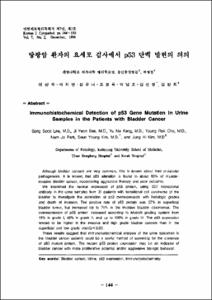방광암 환자의 요세포 검사에서 p53 단백 발현의 의의
- Keimyung Author(s)
- Lee, Sang Sook; Kang, Yu Na
- Department
- Dept. of Pathology (병리학)
- Journal Title
- 대한세포병리학회지
- Issued Date
- 1996
- Volume
- 7
- Issue
- 2
- Abstract
- Although bladder cancers are very common, little is known about their molecular pathogenesis. It is known that p53 alteration is found in about 60% of muscle-invasive bladder cancer, necessiating aggressive therapy and poor outcome. We examined the nuclear expression of p53 protein, using D07 monoclonal antibody in the urine samples from 31 patients with transitional cell carcinoma of the bladder to investigate the correlation of p53 overexpression with histologic grades and depth of invasion. The positive rate of p53 protein was 27% in superficial bladder tumor, but increased up to 71% in the invasive bladder carcinomas. The overexpression of p53 protein increased according to Mostofi grading system from 18% in grade Ⅰ, 45% in grade Ⅱ, and up to 100% in grade Ⅲ. The p53 expression tended to be higher in the invasive and high grade bladder cancers than in the superficial and low grade ones(p<0.05). These results suggest that immunohistochemical analysis of the urine specimen in the bladder cancer patients could be a useful method of screening for the presence of p53 mutant protein. The mutant p53 protein expression may be an indicator of bladder cancer with more proliferative potential and/or aggressive biologic behavior.
- Alternative Title
- Immunohistochemical Detection of p53 Gene Mutation in Urine Samples in the Patients with Bladder Cancer
- Publisher
- School of Medicine
- Citation
- 이상숙 et al. (1996). 방광암 환자의 요세포 검사에서 p53 단백 발현의 의의. 대한세포병리학회지, 7(2), 144–150.
- Type
- Article
- ISSN
- 1017-0391
- Appears in Collections:
- 1. School of Medicine (의과대학) > Dept. of Pathology (병리학)
- 파일 목록
-
-
Download
 oak-bbb-1734.pdf
기타 데이터 / 386.16 kB / Adobe PDF
oak-bbb-1734.pdf
기타 데이터 / 386.16 kB / Adobe PDF
-
Items in Repository are protected by copyright, with all rights reserved, unless otherwise indicated.